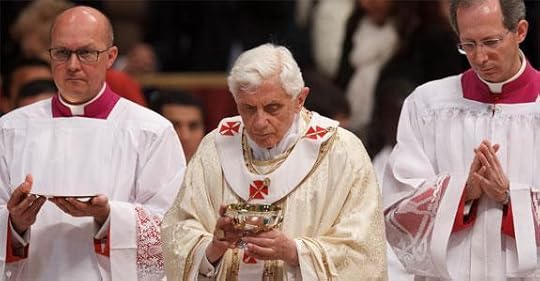The “All” and the “Many”
The “All” and the “Many” | Fr. James V. Schall, S.J. | Catholic World Report
At stake are correct understandings of salvation, divine revelation, and liturgy
“The many bear responsibility for the all. The community of the many must be the lamp on the lampstand, a city on the hilltop, yeast for all. There is a vocation that affects each one of us individually, quite personally. The many, that is to say, we ourselves, must be conscious of our mission to responsibility for the whole.
— Pope Benedict XVI, Letter to Archbishop of Freiburg, April 14, 2012.
I.
Evidently, a number of German bishops maintain that the liturgical translation of the second consecration prayer should still read that this sacrifice is to be offered “for all,” and not for “many.” The German pope is dealing with stubborn German bishops. He promised those bishops he would write a short letter explaining why “for many” is to be used and not “for all.” Benedict XVI notes that they did very little, if anything, to explain the proper reasoning for the “for many” translation.
His letter, sent this past month, sets forth the reasons why “for many” is the proper wording. Basically, it is because those are the words Christ used as reported in the Gospels of Matthew and Mark. The pope again affirms that what Christ said is normative. The bishops’ office is to pass down not their opinions or interpretation but what was given to them all from the beginning.
In dealing with the reasons for this issue, Benedict recalls that, after the Second Vatican Council, some exegetes wanted to use the term “for all” because they thought it referred to Isaiah 53 concerning the Suffering Servant who was to suffer for all. It turns out this exegesis of the text has now been dropped by all scholars. However, a pastoral problem remains. People were led to understand that the words “for all” meant Christ died for everyone, so when the phrase “for many” is used, it seems the scope of salvation was narrowed from all to a few. This dubious understanding caused confusion for many Catholics.
The task to which the pope addressed himself was to explain clearly why the words now in all the canons, “for many,” were the proper ones. In doing so, he emphasized that Christ was indeed sent to save all men. That mission is clear. So why not say so? Here is where something remarkable about this pope comes in. He is so erudite and alert that he foresees problems, real problems, where most of us do not. The use of the term “for all” can easily come to undermine the way in which God, through Jesus Christ, intended to redeem us—that is, all men. If Christ simply came “for all,” it would be easy to make cases for salvation from sources that were not really related to salvation history beginning with Jewish revelation. In fact, this avenue has been a problem as the Holy Father (then Cardinal Joseph Ratzinger) demonstrated in Dominus Iesus, the August 2000 declaration of the Congregation for the Doctrine of the Faith, “On the Unicity and Salvific Universality of Jesus Christ and the Church”.
So what about the use of “for many?”
Carl E. Olson's Blog
- Carl E. Olson's profile
- 20 followers




